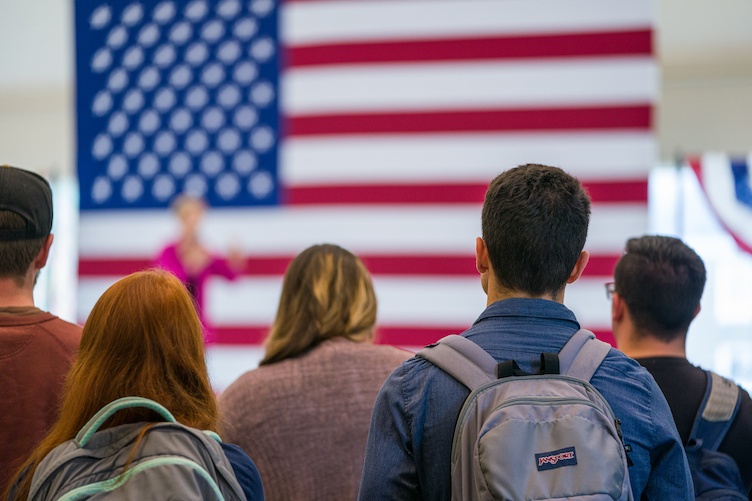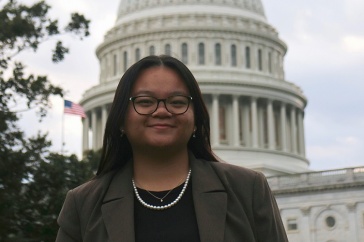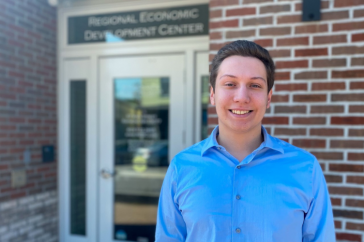
Simmering tension between New Hampshire state leadership and the Democratic National Committee (DNC) over the Granite State’s first-in-the-nation primary election recently bubbled over, with the New Hampshire Attorney General’s Office aiming a cease-and-desist letter at the DNC after the national party referred to the Jan. 23 state democratic primary as “meaningless.”
The dispute centers around a decision by the DNC to make South Carolina the first state to hold a primary in the 2024 presidential campaign cycle. New Hampshire – which has held the first primary in each presidential cycle dating back to 1920 – has remained firm in its position that it would not budge from the first spot, citing a state law that went into effect more than 40 years ago. That prompted the DNC’s dig that such a contest would be meaningless.
The fallout from that squabble has led to something of a dampening of excitement around the New Hampshire primary this time around, UNH experts say, and they believe it is fair to wonder what the long-term ramifications of the change might be for the Granite State.
“There’s always been this ghost of a threat to New Hampshire’s first-in-the-nation status, but now it’s become reality, so that has definitely brought a different feel to it, this idea that something is lost that might never come back,” says Dante Scala, professor of political science at UNH and a nationally recognized expert on presidential politics and campaigns.
New Hampshire law dictates that the state shall set its primary election at least one week before any similar contest, which is precisely what transpired this year despite the challenge from the DNC (Scala notes that there has been no sign of a challenge to the state's first-in-the-nation status from the Republican Party).
The result is that President Biden is not on the ballot, sparking a write-in campaign for an incumbent president in New Hampshire for the first time since 1968, says Andrew Smith, professor of practice in political science and director of the UNH Survey Center and a nationally known expert on presidential elections, U.S. primaries and political polls.
“I think the possible long-term ramification on the Democratic side is what happens with any sort of change – it becomes precedent,” Smith says. “A lot of people within the Democratic Party have wanted to move New Hampshire out of that first slot, and they used this as an opportunity to do it. That might increase pressure on candidates in the future to not even campaign in New Hampshire.”
That would represent a significant change after more than 100 years. Although it wasn’t necessarily a stroke of savvy political maneuvering so much as good old-fashioned Yankee hardiness that initially led to New Hampshire becoming the first state in the nation to hold a presidential primary in 1920.
While other states scheduled their primaries in May to match elections for state offices, New Hampshire sought to settle on March – to save some money.
“The reason we held ours so early is because we were cheap – the primary was originally scheduled in May because that’s when most midwestern states had theirs, but a New Hampshire state rep said, ‘Well, we already have town meeting day in March, why should we open up the town hall and put the heater on twice?’” Smith says.
Regardless of the origin, being first has been something of a boon for the state, if not economically than through the national attention it brought to the area. Smith and Scala both noted that the financial benefit to the state is difficult to quantify and was likely never massive, but becoming the center of the political universe for a time every four years showcased the state’s mountains and recreation areas and helped make New Hampshire something of a destination for some.
It also became part of the state’s identity.
“For people in the state it’s important because it’s really the only thing New Hampshire is known for,” Smith says. “It’s kind of central to New Hampshire’s image of itself. It’s something about the state that’s unique.”
The changes enacted by the DNC stand as a real threat to that, Smith and Scala say. While it’s unlikely a proposal to change the New Hampshire state law would pass, even considering a world where such a proposal could be made represents a significant shift. And the new precedent could make for challenging choices by candidates in the future.
“The very idea that someone might propose such a thing once upon a time would have been heresy,” says Scala of potentially changing the state law. “If a candidate is aspiring to the presidency but going to New Hampshire would be seen as defying your party, it wouldn’t come without risk. So that’s the concern – if you hold the primary but no democratic candidates come, is it really a primary?”
Adds Smith: “Primaries exist because candidates think they’re important, so as long as candidates think it’s important and come to New Hampshire, it will be significant.”
The specter of a major part of the state’s political distinctiveness fading is daunting, Scala acknowledges, but he remains confident Granite Staters would adapt to a new reality despite a changing identity if they should have to face it – and there’s even local precedent for it.
“The New Hampshire primary has been a symbol of the idea that anybody can get involved in politics, and if you lose that, you lose something,” Scala says. “I used to think the primary was kind of equivalent to what the Old Man on the Mountain once was. But the Old Man on the Mountain is gone, and things change, and we persevere. We would still have important parts of our civic fabric even if that piece was taken out of it.”
-
Written By:
Keith Testa | UNH Marketing | keith.testa@unh.edu



















































